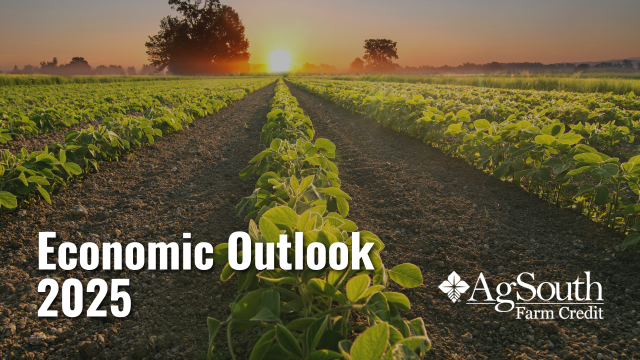Economic Outlook 2025: Opportunities for Landowners, Farmers, and Rural Communities

Economic Outlook 2025: Opportunities for Landowners, Farmers, and Rural Communities
As we navigate through global economic changes, it's essential to focus on the opportunities and resilience that lie ahead. Whether you're a lifestyle landowner, a traditional farmer, or someone considering a move to the countryside, understanding the broader economic landscape is key to making informed and proactive decisions.
To help break it all down, we sat down with Stevan Novakovic, economist at Farm Credit of Central Florida, and Hunter Carson, Capital Markets Portfolio Manager with AgSouth Farm Credit for a wide-ranging conversation on the state of the economy, housing, agriculture, and what consumers should expect in the months ahead.
The Big Picture: A Fast-Moving Economy
Novakovic emphasized that much of today’s economic volatility is being driven by rapid policy shifts from the executive branch. These changes are affecting everything from employment and inflation to housing and trade. Despite the challenges, there are numerous opportunities for growth and adaptation.
“There’s a lot of volatility and uncertainty because we don’t know what’s going to happen next,” Novakovic explained. “Things are moving so quickly that it makes long-term planning difficult. However, this also opens up new avenues for innovation and strategic thinking.”
Carson adds, “in the ever-evolving world of agribusiness, market conditions continue to shift such as consumer preference, and regulations, creating both challenges and opportunities for producers, businesses, consumers, and investors alike.” Staying ahead of these changes is crucial for risk management and long-term success.
Housing: A Market in Transition
The U.S. housing market is still feeling the aftershocks of the 2008 financial crisis. For over a decade, the country underbuilt homes—leading to a significant deficit by the time the pandemic hit. Add in low mortgage rates, retiring boomers, and a surge of millennial buyers, and you get a perfect storm.
Now, with rising interest rates and insurance premiums, especially in the Sunbelt, many homeowners are staying put. The result? A market where only life events or investor sales are driving transactions.
“If you can afford it and you love the property, now is still a good time to buy,” Novakovic said. “Don’t let interest rates be the only deciding factor. The long-term benefits of owning property in desirable locations outweigh temporary fluctuations.”
Agriculture: Embracing Efficiency and Innovation
For traditional farmers, these economic shifts present both challenges and opportunities. Novakovic pointed to tariffs, rising input costs, and global trade tensions as key concerns. However, the agricultural sector is also witnessing remarkable advancements in technology and efficiency.
“American agriculture is incredibly efficient, but we need new markets,” he said. “We’re producing more on less land, but that output needs somewhere to go. Embracing technology and AI in farming is paving the way for unprecedented growth and precision.”
He also highlighted the growing role of technology and AI in farming, along with the political battle over the right to repair farm equipment—an issue gaining traction at both state and federal levels.
Commodity Price Trends: A Mixed Bag
The AgSouth territory of Georgia, North Carolina, and South Carolina is seeing a push-and-pull effect across various agricultural commodities:
- Cotton prices remain depressed, falling below breakeven levels according to UGA's enterprise budgets, making it a challenging year for growers in this sector.
- Peanut prices, on the other hand, are providing some relief, counteracting the decline in cotton prices.
- Corn and soybean markets while declining from highs earlier this year, remain stable, with positive basis levels across the Southeast.
- Beef prices are in a unique position—great for producers, difficult for consumers.
- "While cattle farmers are benefiting from high prices, families at the grocery store are feeling the pinch," says Carson.
What Consumers Will Notice
From the grocery store to the gas pump, consumers are already feeling the effects of inflation. But Novakovic clarified a common misconception:
“Prices aren’t dropping—they’re just rising more slowly. Inflation at 2.3% still means prices are going up. However, consumers can mitigate these impacts by making informed choices and seeking value in their purchases.”
Expect continued high prices for beef, fresh produce, and gasoline, especially as labor shortages and international trade disruptions persist.
The Importance of Risk Management
In uncertain times, managing expenses can be more controllable than increasing income. Smart financial planning is key:
- Locking in profits as early as possible can make a huge difference in volatile markets.
- Diversifying investments and commodities ensures more stable returns.
- Expense control remains a fundamental strategy—keeping costs low allows businesses and households alike to navigate uncertainty with greater flexibility.
- Businesses should keep liquidity on hand to help weather any adverse events.
Looking Ahead: 2025 Forecast
With new trade deals emerging in the Middle East and ongoing negotiations with China, the global economic chessboard is shifting. Novakovic noted that while some recent agreements have helped avoid the worst-case scenarios, the future remains uncertain. However, this uncertainty also brings opportunities for strategic planning and resilience.
“Now is not the time to be greedy,” advises Novakovic. “It’s a time to hedge your risks, lock in profits, and make measured decisions. The proactive strategies you adopt today will pave the way for future success.”
Carson explains, “the agribusiness landscape will continue to change, and staying informed on market trends is essential for making sound long term financial decisions. Whether you're a producer, investor, business, or consumer, adapting to new realities, catering to your end user, and managing risk effectively will be the key to success in the years ahead.”
Final Takeaways
Whether you're buying land, investing in farm equipment, or just trying to make sense of your grocery bill, both Novakovic and Carson recommend:
- Live within your means.
- Don’t delay necessary purchases out of fear.
- Make informed, cautious decisions.
“If you find a farm you love or a house you can afford, don’t wait forever. Just be smart about it,” says Novakovic.
About the Contributors:

Stevan Novakovic holds an M.S. in Public Policy from Georgetown University with a focus in econometrics. Prior to joining Farm Credit of Central Florida he conducted economic research on agricultural commodities for IHS Markit (previously Informa Economics Group), and spent time in hedging/risk management and as a commodities trader for Central States Enterprises, Inc. Stevan also earned an M.A. from Columbia University and undergraduate degrees from the Moore School of Business at the University of South Carolina, where he triple-majored in International Business, Global Supply Chain and Operations Management, and Finance with a minor in Russian.

Hunter Carson is a Capital Markets Portfolio Manager with AgSouth Farm Credit. Carson manages a diverse portfolio of large middle market agribusinesses that support farmers and ranchers across the Unites States.